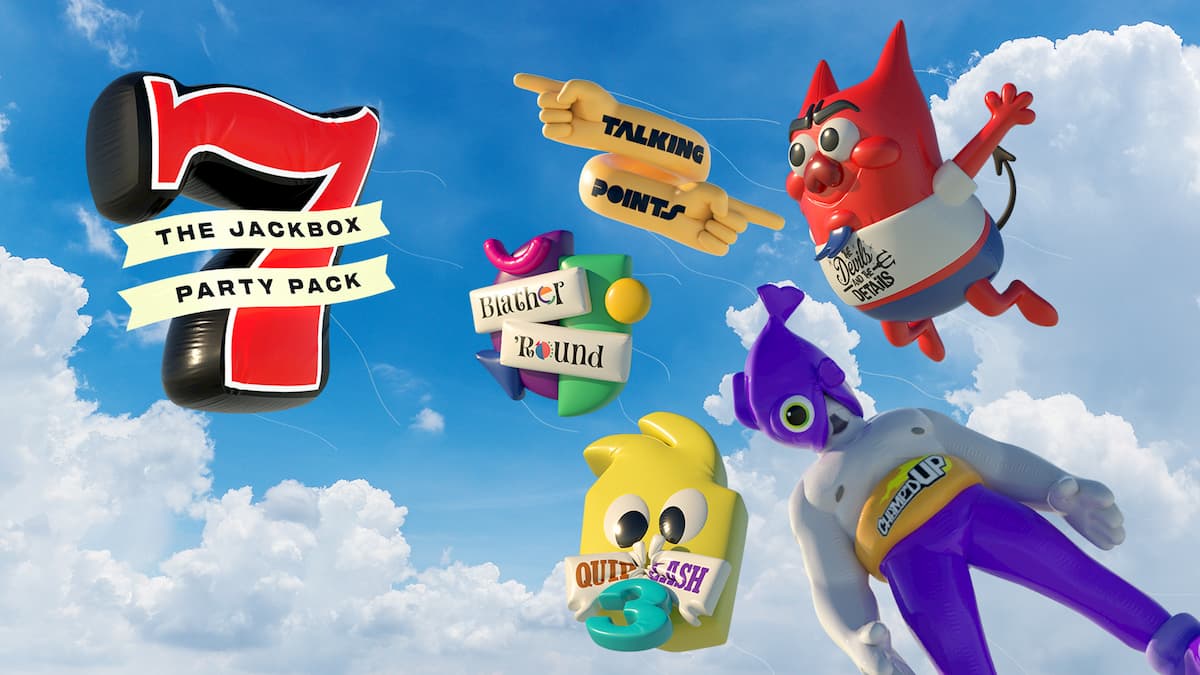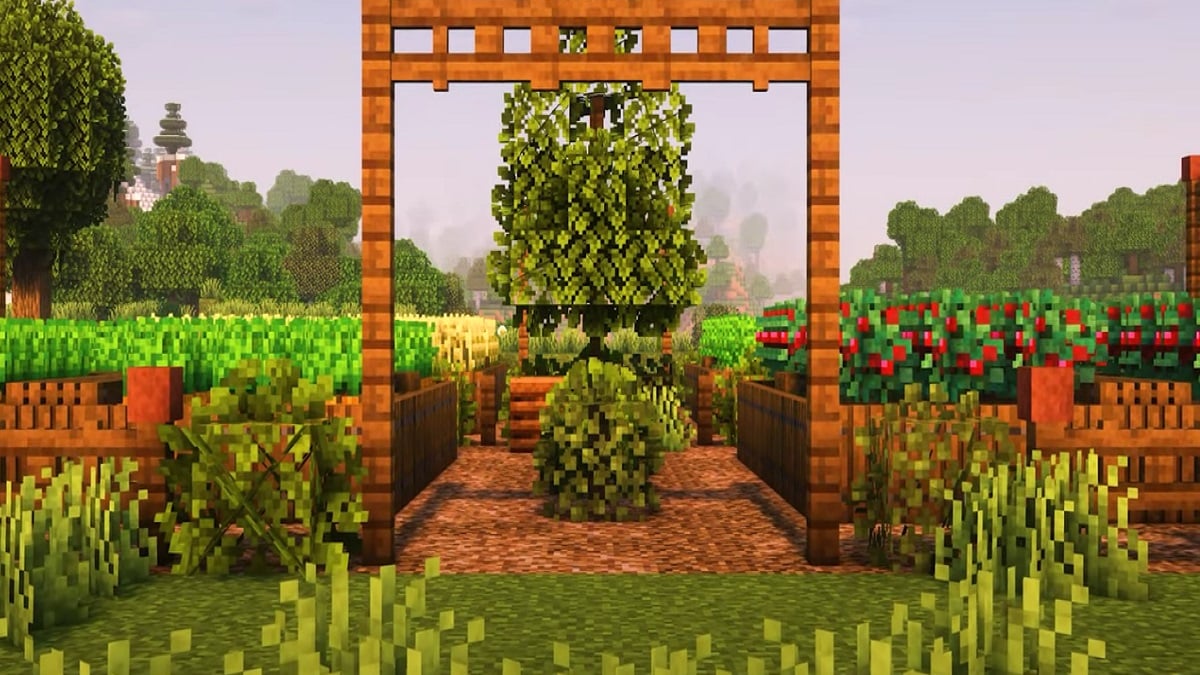One of the most endearing traits of any Jackbox Party Pack is how high-concept most of the games contained within are — you can explain the premise of these games to any novice and create unlimited hijinx. But with Jackbox Games turning in a new collection every year, more concepts are going through the pipeline, and the mass volume of them are diluting the ease of use of these packages. The Jackbox Party Pack 7 is undoubtedly fun, but explaining these concepts to new players is more of a challenge than ever.
There are five multiplayer games in The Jackbox Party Pack 7, one being an update of an old favorite, and the other four retaining elements from previous games while still bringing something original. As with previous games, you use your real-life phone, tablet, or web browser as a controller.
Quiplash 3

Since the early days of Jackbox Games, Quiplash has been the most-liked, if not the most well-known gem in their entire catalog. It strips down the Jackbox concept to its core — write short, bite-sized quips based on prompts to try to make your friends laugh.
This is the third “iteration” of Quiplash, but truth be told, Quiplash 3 doesn’t feel like too much of an update. The only new addition is a change to the third round, which instead of making you write some sort of contrived acronym or something of the like, you’ll do a Thriplash and come up with three items based on a prompt. It’s basically a comedy “rule of thirds” contest.
Other than that, the visuals have shifted from a cartoon to a claymation-like style, and you can choose your own little avatar, with the roster including a cactus and a poop emoji. By headlining the entire package with Quiplash 3, it’s clear that Jackbox is depending on this standby to move copies of its new product. The most recent packs did the same with Trivia Murder Party and You Don’t Know Jack, but none of these old games have received fun, noteworthy changes since Fibbage 3 in the fourth pack. If you’re considering getting an entire bundle just for Quiplash 3, you’re actually already set if you have the previous versions.
The Devils and the Details

Here’s where things get super complicated. The Devils and the Details is part co-op game and part competitive game; let’s say that the ratio is 70-30. All players act as demons passing as an average suburban family, and you’ll have to work together to complete tasks and build up a meter. These tasks are not unlike playing WarioWare microgames on your real-life phone, but you’ll find that many of these objectives overlap and will require you to nab other players for help. For example, a solo task might be you making your bed, while a co-operative task has you recite a recipe while two other players look through the fridge and pantry (through extremely long lists on your phone) for the ingredients. To complicate matters further, “selfish tasks” can pop up that can earn players more individual points at the cost of hampering the family’s progress.
It’s a difficult concept to grasp when verbalized, and even in practice, it’s a bit overstimulating. The Devil and the Details appears to be designed to be controlled chaos, with players talking over each other and yelling for help. All of the action is on your phone, or whichever device you use for Jackbox, and the main game display is totally incomprehensible with a dense amount of information.
The experience is close to the mobile game Spaceteam, but it’s astounding how household chores have become as complicated as operating a rocket ship. It’s an entertaining romp, although it’s difficult to gauge how “well” you actually did, and the point totals feel meaningless by the end.
Champ’d Up

There’s usually a formidable drawing game in every Jackbox pack, and Champ’d Up makes a strong case for itself. This game might be stressful for people who lack the skills to draw bodies (i.e. myself), but practically anyone should be able to come up with something funny and creative here. You’ll be drawing a “champion” based on a silly prompt, like “The Champion of Mondays.” In my game session, someone drew “Captain Sleeps Till Noon.”
In the next part of the game, you’ll be shown what another player’s champion looks like, but without the context of what they’re the champion of. You’ll then draw and name an “underdog” to fight that champion, although you’ll have to fill in the gaps yourself of what contest they might possibly fight in.
Jackbox is at its best when the prompts are based on content created by other players — it creates an amusing feeling of call and response. Take “Captain Sleeps Till Noon,” who was greeted by another player’s champion, “Paralysis Demon.” Sure, it may not have made sense at the end as a “Champion of Mondays,” but it’s totally a funny reactionary move. You’ll vote for the “better” contender for the challenge, and it’s presented with a fighting game-like HUD.
Unfortunately, the main problem with Champ’d Up, at least at launch, was a technical one. Drawings appeared incomplete on-screen, although when voting for a champion on your phone, the entirety of the drawing was displayed. It’s a comedown for players who worked hard on their comedic masterpiece, and the joke won’t land as well as a result.
Talking Points

Recent Jackbox Party Packs have incorporated a game that includes an aspect of verbal performance and presentation, with Patently Stupid from the fifth pack being my personal favorite. Talking Points is here to replicate the anxiety of public speaking and corporate presentations, which is a plus if you find that element of satire to be funny, but a minus if you genuinely have that public speaking fear.
You’ll be filling in the blank for a fake presentation name, and another player will have to give that talk. Another player will be the “assistant,” changing slides for the presenter, who will be reciting presentation slides verbatim until the assistant displays a picture, to which the presenter will have to improvise and continue the presentation based on whatever outlandish visual is on screen.
Talking Points is good for laughs with friends, but it’s difficult to actually quantify how good your peers are doing. Observing players will not be working with a binary thumbs up or thumbs down to judge the presenter, but rather with a real-time scale. It’s all to say that the metrics of this game are quite confusing.
Ideally, the person who everyone agrees to be the funniest presenter should come out the winner, but it would have been much easier to implement a voting system at the end instead. Talking Points is less of a game and more of a platform to simply screw around with — although some may argue that this is the entire spirit of Jackbox.
Blather ‘Round

The final game in the seventh pack is probably the most high-concept one: it’s just charades, but with text. Each player will select one of three subjects on their device, ordered from easiest to most difficult. When it’s your turn, you’ll have to help the rest of the group guess your term, which is a person, place, thing, or a popular piece of fiction. However, you cannot speak — all you have are predetermined words and phrases to offer as hints. You can mix and match these clue phrases, and as the other players type their guess, you can incorporate their guesses into your clues (i.e. “It’s a lot like [player’s answer].”) For whatever reason, the group I played Blather ‘Round with found the limitations to be more compelling than frustrating.
It can be an extraordinarily difficult game to play, especially if you choose more difficult terms to play with; doing so scores you more points, however. But sometimes, whatever system the game uses to recognize text was annoyingly wonky. Typing in “Oprah” will register as the answer “Oprah Winfrey,” sure, but “Pinot” didn’t work for “Pinot grigio.” In one bizarre moment, the joke answer of “ice bees” registered as correct when the term was “glacier.”
You already know whether or not you like charades, and although working around limitations and trying to think outside the box with what is offered to you is an enjoyable exercise, Blather ‘Round requires a lot of patience.
The verdict
Jackbox Games probably reached a peak with their visual presentation around the fourth or fifth party packs, so there wasn’t much to improve with The Jackbox Party Pack 7. It is wonderful to see each iteration become more accessible on a technical level, with features like an audio reading of room codes and the addition of subtitles. However, it’s a bit strange that many of these accessibility options are set for each individual game instead of the pack as a whole.
I would probably hesitate to present The Jackbox Party Pack 7 over any of the previous ones if I were at a family gathering. There is already a generational and technological gap when it comes to explaining how the game uses your phone browser and how everything interacts with each other, but I would dread to have to explain in detail how these games operate and correct other players in the midst of gameplay. Jackbox Games has proven time after time that the well cannot go dry with game ideas. However, sometimes it might be nice to just keep it simple, stupid.
Final score:
7.5 / 10
| + | Vibrant visual presentation with good accessibility options |
| + | A creative mosaic of original game ideas and new variations of older game types |
| + | An excellent platform for friends to joke and fool around with each other |
| – | Some games are difficult to explain and have unclear or confusing scoring methods |
| – | Minor technical issues with a couple of games |







Published: Oct 24, 2020 01:25 pm